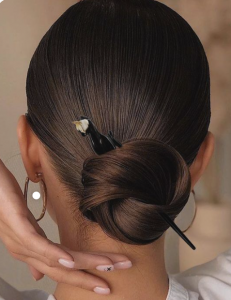Saltwater has been a subject of fascination for its potential benefits and drawbacks, especially when it comes to our hair. Many people have experienced the unique texture and feel of their hair after a day at the beach, leaving them to wonder: is saltwater good for your hair? In this comprehensive exploration, we delve into the scientific aspects, potential benefits, and drawbacks of exposing your hair to saltwater.
Saltwater Composition.
Before diving into the effects of saltwater on hair, it’s crucial to understand the composition of saltwater. Ocean water is primarily composed of salt (sodium chloride), along with various minerals such as magnesium, calcium, and potassium. These elements give saltwater its distinct properties and play a role in how it interacts with hair.
The Effects of Saltwater on Hair Structure.
Hair is composed of a protein called keratin, and its structure is complex. The outer layer, known as the cuticle, consists of overlapping scales that protect the inner layers. When hair is exposed to saltwater, the salt and minerals can impact its structure in several ways.
Hydration and Swelling: Saltwater has a dehydrating effect on hair, drawing moisture out of the hair shaft. Initially, this can lead to dryness and increased porosity. However, prolonged exposure may cause the hair shaft to swell, potentially making the hair feel thicker.
Cuticle Damage: The cuticle, as the outermost layer of the hair, is vulnerable to damage. Saltwater can lift the cuticle scales, making the hair more prone to breakage and damage from external factors like sun and wind.
Mineral Buildup: The minerals in saltwater can accumulate on the hair shaft, leading to a phenomenon known as mineral buildup. This buildup can affect the hair’s texture and appearance, making it feel rough and look dull.
Potential Benefits of Saltwater for Hair.
While prolonged exposure to saltwater may have some negative effects on hair, there are also potential benefits that individuals often notice after a day at the beach.
Volume and Texture: The swelling of the hair shaft in response to saltwater can contribute to increased volume and a unique, textured appearance. Many people appreciate the added body and bounce their hair gains after a day in the ocean.
Natural Beach Waves: Saltwater is renowned for its ability to create natural, beachy waves. The salt and minerals help shape the hair, providing a tousled and effortless look that many strive to achieve with styling products.
Scalp Health: The exfoliating properties of saltwater can have a positive impact on the scalp. It may help remove excess oils and dead skin cells, promoting a healthier scalp environment.
Drawbacks and Precautions.
While there are potential benefits, it’s essential to consider the drawbacks and take precautions when it comes to exposing your hair to saltwater.
Dryness and Frizz: The dehydrating effect of saltwater can lead to increased dryness and frizz, especially for individuals with naturally dry or damaged hair. Using a moisturizing conditioner after exposure can help mitigate these effects.
Color-Treated Hair Concerns: Color-treated hair is particularly susceptible to damage from saltwater. The minerals in saltwater can strip away hair color, leading to fading and changes in hue. Color-treated hair requires extra care, such as protective styling and the use of color-preserving products.
Cuticle Damage: Lifted cuticle scales can make the hair more susceptible to damage from external elements. Combining saltwater exposure with protective measures like hair oils and leave-in conditioners can help minimize this risk.
Mineral Buildup: To counteract mineral buildup, regular clarifying shampoos can be used to remove residues from the hair. This is especially important for individuals who frequently swim in the ocean.

How Can You Prevent Damage from Salt Water to Your Hair?
Preventing damage from saltwater to your hair involves a combination of protective measures and post-exposure care. Here are some effective ways to safeguard your hair and minimize the potential negative effects of saltwater:
Pre-Swim Conditioning:
Prior to entering the ocean, wet your hair with fresh water or apply a leave-in conditioner. This helps create a protective barrier that minimizes the absorption of saltwater into the hair shaft.
Protective Hairstyles:
Consider wearing protective hairstyles such as braids, buns, or hats to minimize direct exposure of your hair to saltwater. This can help reduce friction and prevent the lifting of cuticle scales, which makes the hair more susceptible to damage.
Rinse with Fresh Water:
After swimming in saltwater, rinse your hair thoroughly with fresh water. This helps remove excess salt and minerals that can contribute to dryness and buildup. Use a wide-tooth comb to detangle your hair gently.
Use a Clarifying Shampoo:
Incorporate a clarifying shampoo into your hair care routine to remove any mineral buildup from saltwater. Use it once a week or as needed to keep your hair clean and prevent dullness.
Moisturizing Conditioner:
Apply a moisturizing conditioner after rinsing your hair to restore lost moisture. Look for products that contain hydrating ingredients such as aloe vera, glycerin, or argan oil. Leave the conditioner on for a few minutes to allow it to penetrate the hair shaft.
Protect Color-Treated Hair:
If you have color-treated hair, take extra precautions. Consider using a UV-protective spray or leave-in conditioner with SPF to shield your hair from the sun. Additionally, wear a hat to minimize color fading caused by sun exposure.
Limit Exposure and Rinse Promptly:
Limit the time your hair spends in saltwater. Prolonged exposure increases the risk of dehydration and damage. After swimming, rinse your hair as soon as possible to remove salt and minerals.
Deep Conditioning Treatment:
Incorporate deep conditioning treatments into your hair care routine to nourish and repair any damage caused by saltwater. These treatments can help restore the natural moisture balance of your hair.
Protective Hair Oils:
Apply a small amount of natural oils, such as coconut oil or argan oil, to the ends of your hair before swimming. This can create a protective barrier and reduce the absorption of saltwater into the hair shaft.
Regular Trims:
Schedule regular trims to remove any split ends or damaged hair. This helps maintain the overall health of your hair and prevents further damage from spreading.
Avoid Excessive Heat Styling:
Minimize the use of heat styling tools, such as flat irons and curling irons, especially after exposure to saltwater. Excessive heat can exacerbate dryness and damage.
All in All.
For those who enjoy the beach experience but want to minimize potential damage, incorporating protective measures, such as pre-swim conditioning, post-swim moisturizing, and using color-preserving products, can help strike a balance between enjoying the ocean and maintaining healthy hair. Ultimately, moderation and proper care are key to making the most of the unique relationship between saltwater and your hair.





















